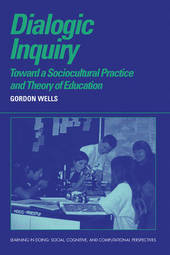
|
Dialogic Inquiry: Towards a Socio-cultural Practice and Theory of Education
Hardback
Main Details
| Title |
Dialogic Inquiry: Towards a Socio-cultural Practice and Theory of Education
|
| Authors and Contributors |
By (author) Gordon Wells
|
| Series | Learning in Doing: Social, Cognitive and Computational Perspectives |
|---|
| Physical Properties |
| Format:Hardback | | Pages:392 | | Dimensions(mm): Height 229,Width 152 |
|
| ISBN/Barcode |
9780521631334
|
| Classifications | Dewey:370.15 |
|---|
| Audience | | Professional & Vocational | |
|---|
| Illustrations |
9 Tables, unspecified; 7 Line drawings, unspecified
|
|
Publishing Details |
| Publisher |
Cambridge University Press
|
| Imprint |
Cambridge University Press
|
| Publication Date |
28 August 1999 |
| Publication Country |
United Kingdom
|
Description
For more than a quarter century, the polemics surrounding educational reform have centered on two points of view: those that favor a "progressive" child-centered form of education, and those that would prefer a return to a more structured, teacher-directed curriculum that emphasizes basic knowledge and skills. Vygotsky's social constructivist theory offers an alternative solution, placing stress on coconstruction of knowledge by more and less mature participants engaging in joint activity. This theory offers semiotic mediation as the primary means of obtaining knowledge, whereby the less mature participants can seek solutions to everyday problems by using resources existing in society. In addition to using illustrative examples from classroom studies, this book provides a comparative analysis of the theories and complementary developments in works by Vygotsky and the linguist M.A.K. Halliday. This unique volume will be of tremendous benefit to researchers in the fields of education, sociolinguistics, and psychology.
Reviews"An important contribution... Dialogic Inquiry is a challenging book to read, both because it raises serious questions about many of the assumptions underlying cognitive science and because it tackles difficult theoretical questions without avoiding their complexity... Wells has demonstrated... that the sociocultural perspective has a great deal to offer our understanding of thinking, knowing, language and learning." Contemporary Psychology
|